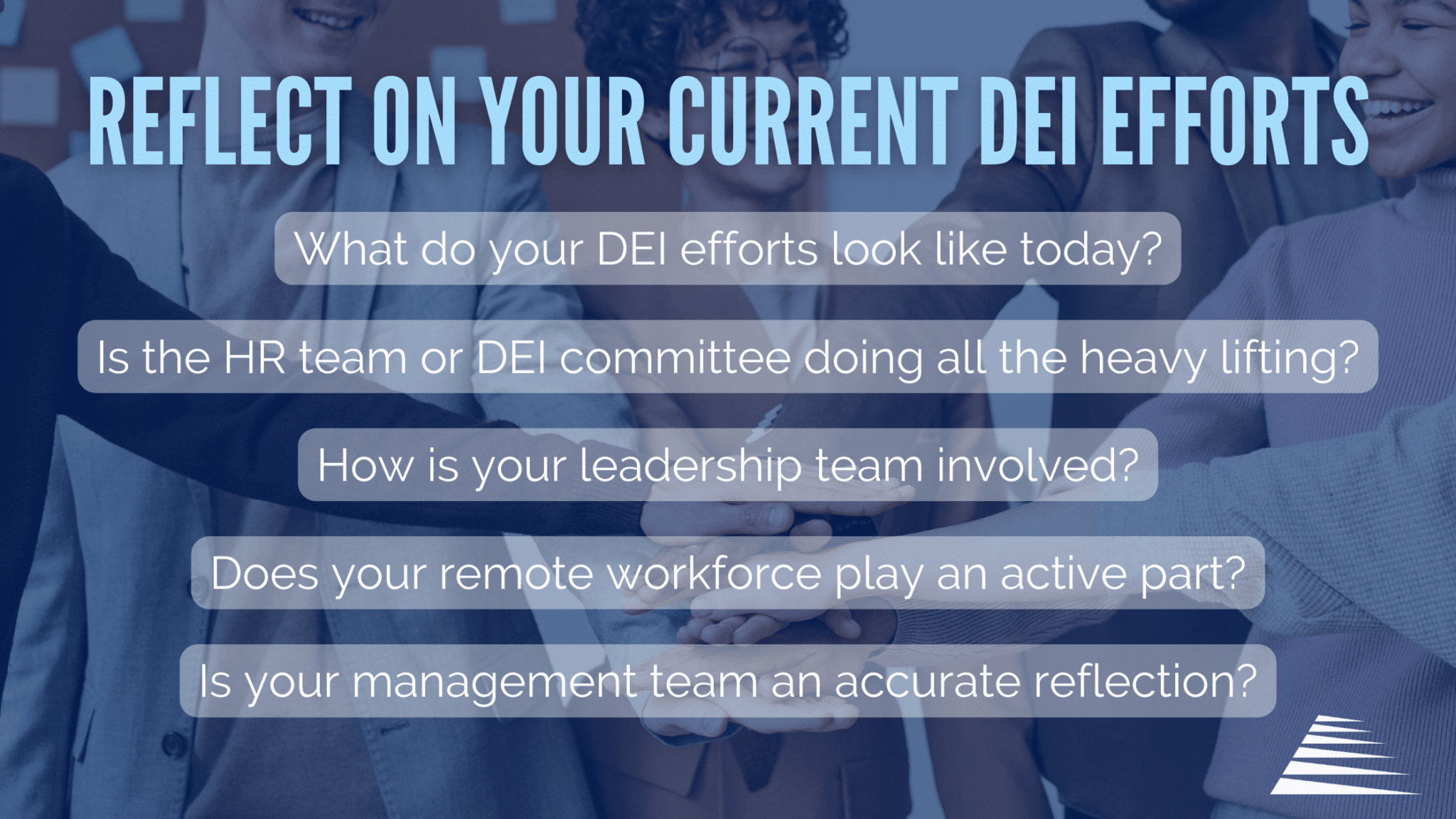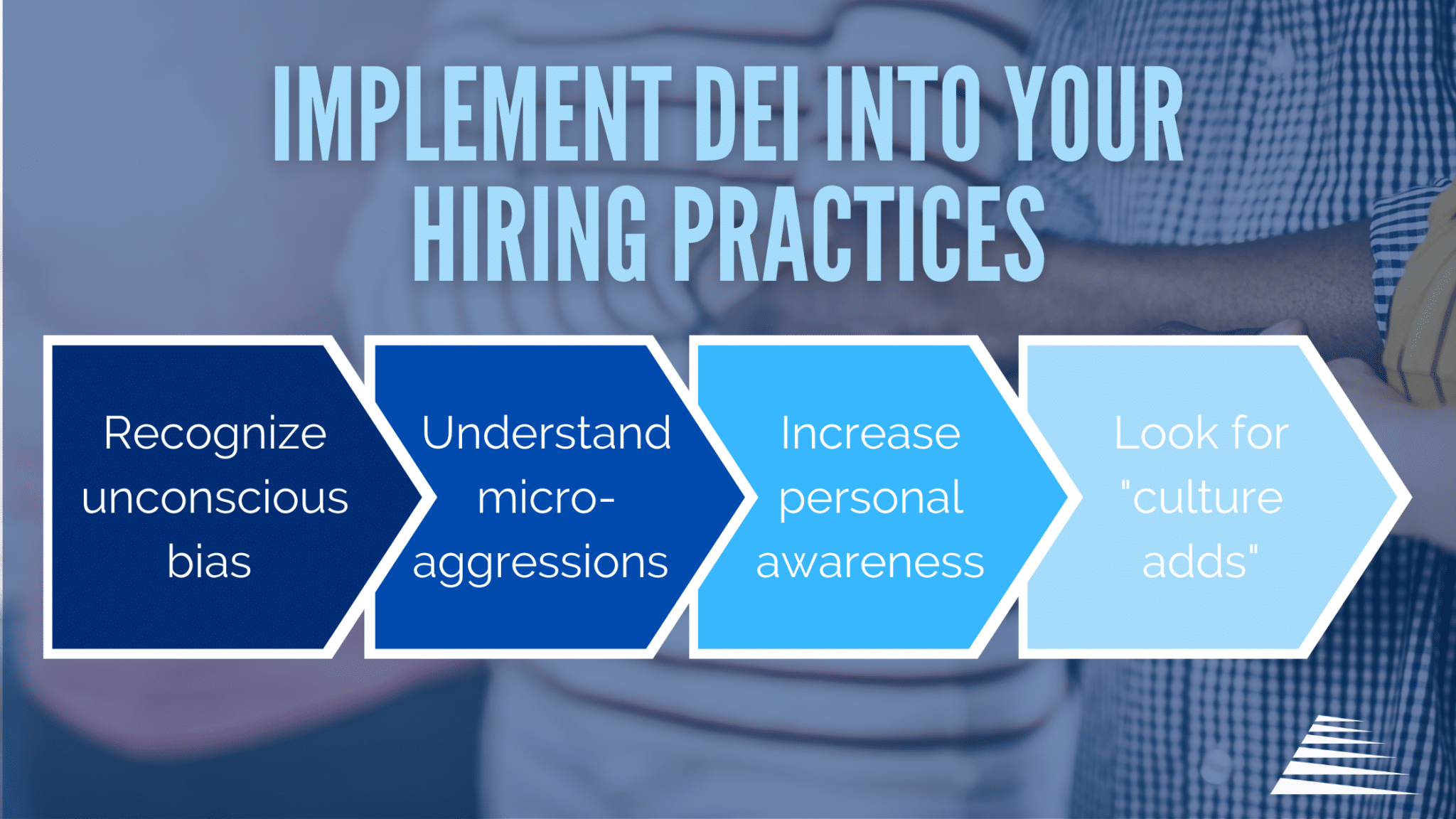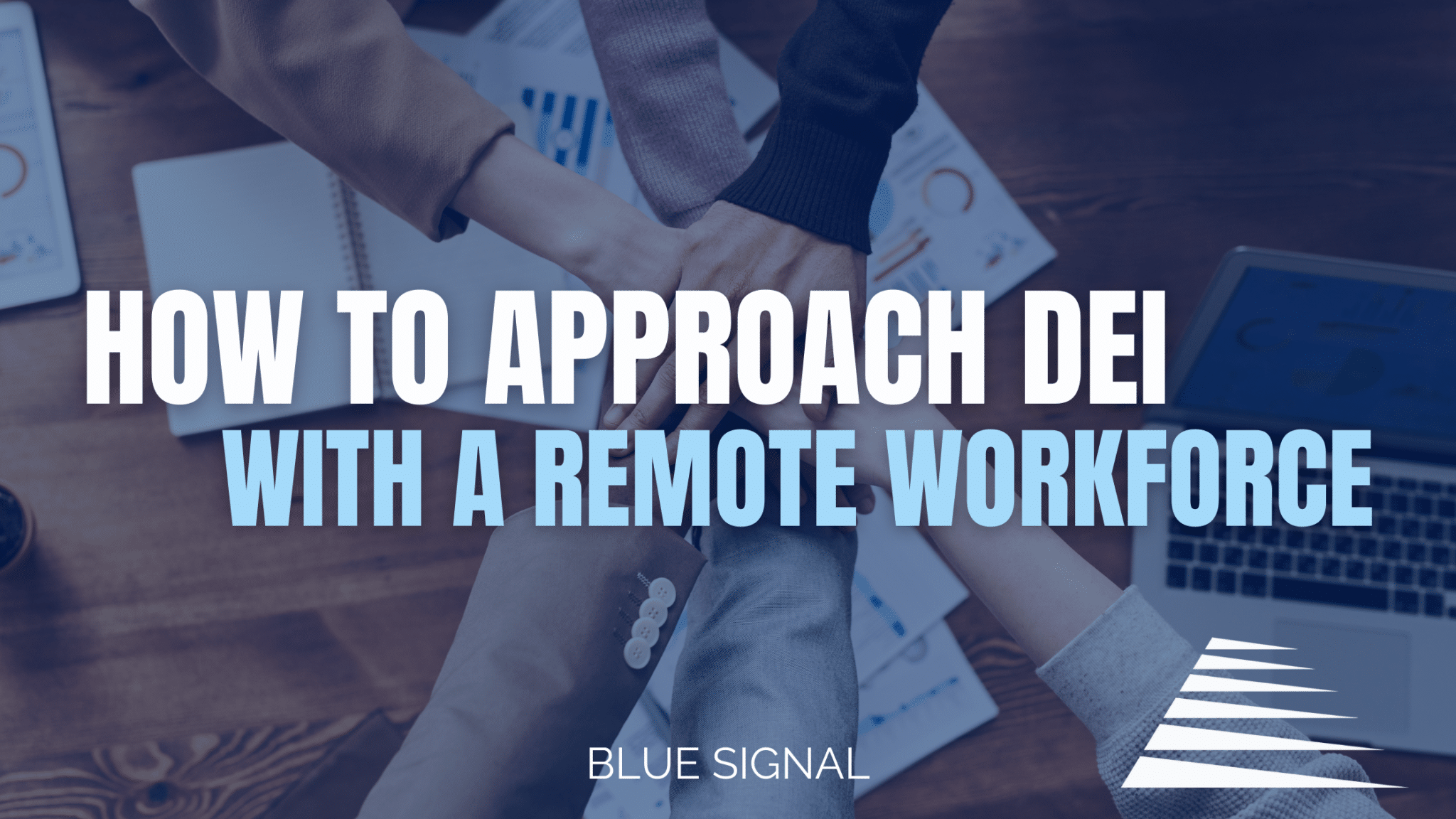Over the last two years, businesses have shifted to a remote or hybrid work model as a result of the pandemic. Remote work has sky-rocketed in priority among job seekers, proving to be a top hiring trend that’s here to stay. Similarly, diversity, equity, and inclusion (DEI) has increased in priority for candidates. Recent studies have shown 2 out of 3 candidates seek out companies with diverse workforces, and 47% of candidates actively look for DEI when considering future employers.
While DEI efforts appear attractive to job seekers, it also brings unparalleled benefits to the company. Companies that incorporate DEI into their workplace see higher levels of engagement, productivity, and innovation. According to Deloitte, millennials are 83% more likely to be engaged at work at inclusive companies. Additionally, inclusive companies earn 2.3x more cash flow per employee. Although implementing DEI may seem like a no-brainer, it can be daunting with a remote workforce. Not sure where to start? Follow our tips below on how to approach DEI with a remote workforce.
Reflect on Your Current DEI Efforts

What Do Your DEI Efforts Look Like Today?
All companies’ DEI efforts have to start somewhere. Before jumping into implementation, take a moment to reflect on your company’s current DEI efforts. Do you have an established DEI practice? If you don’t, you can look at how similar companies are implementing DEI into the culture of their remote workforce. At Blue Signal, our DEI practice focuses on championing diversity efforts and actively working to educate our internal recruiters, hiring managers, and candidates to ensure the hiring experience is free from discrimination and implicit bias. Examples of our DEI efforts include companywide trainings, seminars, and other educational activities. However, there is no one-size-fits-all guide for DEI. Take a look at the companies around you and use them for inspiration for establishing your own practice.
Who's Involved?
Next, reflect on who’s involved in your DEI efforts. Is the Human Resources team or DEI committee doing all the heavy lifting? It may be inauthentic to your brand if you’re not practicing what you preach. DEI efforts need to extend beyond the designated committees as the only representation. It’s important to have all aspects of the business involved, so that DEI efforts are fully assimilated into company culture.
Similarly, look at how your leadership team is involved. As the faces of the company, the leadership team needs to be at the forefront of company-wide initiatives, especially when working remotely. Lack of buy-in from your leadership team will reflect a lack of participation from the rest of the company. Leaders can participate through hosting virtual meetings, guiding activities, or sharing their commitment to DEI through a statement or presentation. For example, Blue Signal’s CEO Matt Walsh wrote and distributed an important message on diversity.
Now it’s time to look at your remote workforce. Do they play an active part in your DEI efforts? To ensure your DEI efforts go beyond a company statement, it’s crucial to engage your remote employees. Spurring participation can be tough without an in-person setting, as people are heavily influenced by those (physically) around them. However, you can get your remote employees involved through virtual training, discussion boards, online seminars, or activities. To involve our remote workforce, Blue Signal has held virtual DEI certification trainings, created employee-led groups, and given back to underrepresented groups in the community through philanthropic donations.
Is Your Management Team an Accurate Reflection?
Finally, how does your management team reflect your DEI efforts? Despite diverse management teams leading to 19% higher revenue, 78% of employees who responded to a Harvard Business study said they work at organizations that lack diversity in leadership positions. When looking at your management team, do they represent diversity in age, gender, and/or race? If not, make a plan to address that and begin to implement DEI into your hiring practices.
Implement DEI into Your Hiring Practices
Diversity, equity, and inclusion in hiring is more than hitting a quota. To foster a more diverse and inclusive remote workforce, it is crucial to implement DEI into your hiring practices. Consequently, setting up a diverse hiring team should be the first step in revamping your hiring and recruiting processes. This ensures DEI efforts start even before employees join the team.

Recognize Unconscious Bias
During the hiring process (both remote and in-person), hiring managers should be aware of their unconscious bias. Unconscious bias, or implicit bias, refers to the negative attitudes or stereotypes about a group of people that impacts an individual’s understanding, actions, and choices unconsciously. According to BrightTalk, “79% of HR professionals agree that unconscious bias exists in both recruitment and succession planning decisions.”
Understand Microaggressions
As a result of unconscious bias, microaggressions can occur. Microaggressions are brief verbal, behavioral, or environmental indignities, whether intentional or unintentional, that communicate hostile, derogatory, or negative slights and insults to marginalized individuals and groups. Both unconscious bias and microaggressions are forms of discrimination that can hinder the hiring process.
Increase Personal Awareness
Increasing awareness through education and training can help prevent unconscious bias and microaggressions altogether. Harvard University offers free online tests to uncover implicit bias, with topics spanning religion, race, sexuality, appearance, and ability. Hiring managers that are aware of these factors within themselves will be able to better implement DEI best practices into the hiring process.
Look for “Culture Adds”
In addition, hiring managers should look for candidates that are a “culture add” rather than a culture fit. “Culture adds” are potential employees that could add to the existing culture by bringing their diversified ideas and experiences, rather than mirroring it. Looking for those candidates that will build on to your culture will eventually result in more diverse teams. Ultimately, implementing DEI into your hiring practices will set the foundation for a diverse and inclusive workforce.
Provide Resources
Whether you're a veteran in the DEI space or just learning about it, resources can greatly benefit your DEI practice. Providing resources can encourage employees no matter where they are in their personal DEI journey. However, with a remote workforce, it can be difficult to gauge where each employee is in their journey. Through one-on-one discussions or surveys, you can assess each employee and provide them with apt resources; such as online article libraries, DEI newsletters, infographics, or quarterly book clubs. It’s important to have resources that are readily accessible and at every level of experience.
Companies can also establish groups or forums where diversity, equity, and inclusion are promoted, encouraged, and can be discussed. Our employee-led group, Blue Signal Search Women of the Workplace (BSS WOW), serves to promote the education, connection, and empowerment for women (and those who support women) and their contributions to the broader goals of Blue Signal and beyond. BSS WOW meets virtually bi-monthly, covering complex topics on diversity and inclusion, biases, intersectionality, discrimination, privilege, and more. This resource has positively affected the remote culture at Blue Signal and has increased involvement in other companywide DEI efforts.
Watch the video below to hear from some current members about how BSS WOW is breaking biases, how it's impacted company culture, and what they’ve learned from the group.
Embed DEI into Your Remote Culture
DEI is not a single initiative, but an element that should be embedded into your company culture. In the age of working from home, new obstacles arise daily – but a remote workforce doesn’t have to be one when implementing DEI efforts. You can still implement initiatives and activities virtually. Consequently, embedding diversity, equity, and inclusion into your remote culture will bring unparalleled benefits in maintaining connections.
When dealing with a remote workforce, the aspect of inclusion is especially prominent. According to Gallup, the biggest struggle among remote workers is “loneliness,” as remote environments can leave employees feeling isolated. Thus, establishing a sense of belonging through inclusion efforts is incredibly important. One way you can do that is by aligning company values and DEI goals with remote employees. Giving employees opportunities to provide input and help improve the company will create a deeper connection to the company, which in turn creates stronger employee engagement. However, make sure that all voices are equally heard. Establishing an anonymous DEI suggestion box could help mitigate people feeling pressured to give feedback based on being the token representative.
In addition to establishing a sense of belonging and increasing employee engagement, embedding DEI into your remote culture can improve innovation. Inclusive companies are 35% more likely to outperform their competitors, and 1.7x more likely to be innovative. Furthermore, 74% of millennial employees believe their organization is more innovative when it has a culture of inclusion. Not only will embedding DEI into your culture ensure the continuity of the efforts, it will drive your company’s success.
Conclusion
Diversity, equity, and inclusion is a marathon, not a sprint. If having a remote workforce makes the process seem daunting, start by reflecting on your current DEI efforts. If your practice is not already established, look to similar companies and take inspiration from them. Then, strategize ways to implement DEI into your hiring strategy, as your company should be a reflection of diverse hiring. After assessing where your company is with DEI, make sure resources are readily available and varied. Finally, ensure the continuity of DEI by embedding it into your company culture. This will result in an increased sense of belonging, innovation, and engagement among remote employees. However, good leaders and companies should always be open to evolving and adjusting, as these essential factors will continue to transform as understanding deepens and needs change.
As recruiters, we play a key role in advancing and promoting workplace diversity, equity, and inclusion. If your company needs help with DEI recruiting support, strategy, or implementation, reach out to us today.

